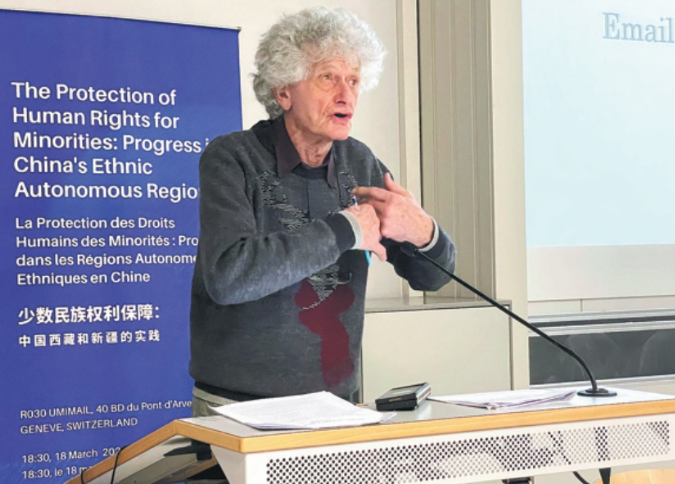Experts hail Xizang plan for students
Updated: 2024-03-20 (China Daily)  Print
Print 


Boarding school program benefiting 1 million children in region applauded

Belgian Tibetologist Andre Lacroix speaks at a human rights seminar on Monday. CHEN WEIHUA / CHINA DAILY
Dechen Shak-Dagsay, a Swiss Tibetan musician, said she wishes the student boarding school project in Xizang will be "very sustainable and successful".
She made the comment during a seminar on Monday at the University of Geneva, where scholars from China and Europe compared notes on the protection of human rights for ethnic minorities in China.
Jia Chunyang, executive director of the Center for Economic and Social Security Studies of the China Institutes of Contemporary International Relations, gave a presentation on the boarding schools in Xizang based on his research.
His study finds about two-thirds of students say they "like it very much" or "like it" living in boarding schools, while 30.56 percent say "average". Only 5.15 percent of students chose "dislike" or "dislike very much".
An overwhelming 71.43 percent of the parents felt "reassured" about their children living in boarding schools.
"Boarding schools in Xizang are an important manifestation of the Chinese government's legal protection and promotion of the rights of school-age children of all ethnic groups in Xizang to receive education and the promotion of the all-round development of school-age children of all ethnic groups," Jia said.
He said the boarding schools are not perfect and his survey shows that some students hope for more varieties of food, more spacious dorms and more sports events.
"These are areas where we need to continue to work hard in the future," he said.
Shak-Dagsay, who had collaborated with the late legendary singer Tina Turner, visited Lhasa for the first time last year and played a concert there.
"You can imagine the feeling. I grew up in Switzerland from the age of 3, and to be in Lhasa for the first time in my life after 64 years, and the first time hearing the Tibetan language spoken all over the place. It was like coming home, coming to the place where my roots are," she said.
She was happy to learn from the presentation that China has successfully implemented an unprecedented educational program that can benefit almost 1 million Tibetan children.
She had watched a TV program about the boarding schools which she says "are putting a lot of emphasis" on teaching the Tibetans their native language. "It's very important that they read and write in Tibetan, and also obtain an academic degree in this subject," she said.
Unique opportunity
"Let me thank you for giving our young generation in Tibet such a unique opportunity to excel in their studies, and each one becomes a precious gem, shining from the roof of the world. Thank you also for the absolute poverty eradication of over half a million Tibetans in Tibet autonomous region by the end of 2019," she said.
"This is indeed very impressive. And it deserves acknowledgment for enabling Tibetans (to live) a dignified life."
The seminar, sponsored by the China Society for Human Rights Studies, saw a packed classroom.
Andre Lacroix, a Belgian Tibetologist, shared his experience of how he got interested in Xizang after visiting China in the 1990s. He had accompanied his daughter who was pursuing China studies and is now a Sinologist teaching at a French university.
He told China Daily that "in Europe, we are under the impression that Tibetans are an oppressed minority, that their rights are not respected".
"However, when you go to Tibet, you open a totally different window on the situation," he said in French.
He said that in 1999 before he visited Xizang for the first time, he also believed that Tibetans were victims of cultural genocide from the various publications he read.
"But I witnessed the richness of monasteries, the omnipresence of monks, the vitality and abundance of cultural events," he said.
chenweihua@chinadaily.com.cn








